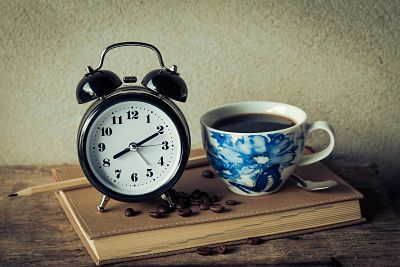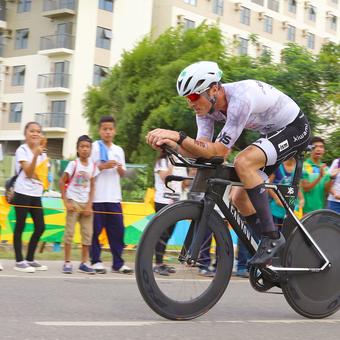Caffeine is a go-to supplement for athletes across many sporting disciplines, thanks to its proven and legal performance-enhancing effects (the World Anti-Doping Agency approved its use in sport in 2004).
It especially lends itself to enhancing endurance performance but are athletes using it effectively? And if you aren’t using caffeine already, should you be?
Caffeine's drawbacks and benefits
For many people, a caffeinated drink is the only way to get the day started on the right footing. For example, Precision Fuel & Hydration founder Andy Blow once walked through a coffee shop's drive-thru and convinced the poor barista to serve him a double shot Americano as it was the only place open at 4:30am that day!
Knowing Andy’s penchant for an early morning run, he was no doubt looking for a quick boost before heading out to get some pre-work miles in.
Andy’s not alone in needing that coffee 'hit' to get his day going as caffeine is a stimulant drug that can increase alertness and it has also been shown to reduce perception of effort, as well as increase fat oxidation - an effect which might preserve muscle glycogen stores and delay an athlete’s time to fatigue.

That said, caffeine does have its pitfalls. Getting the application wrong, especially the dose, may cause adverse effects like jitteriness, headaches, stomach issues and regular trips to the bathroom. In relation to performance, it may also exacerbate the effects of adrenaline, raise heart rate and compound pre-race nerves.
In an extreme case of when caffeine use goes wrong, researchers at the University of Northumbria made an embarrassing error when they delivered 30 grams of caffeine to participants instead of 0.3 grams - a dose 100 times greater. The purpose of the study was to examine the effects of a moderate caffeine dose upon exercise performance but ended with two students being hospitalised.
How athletes use caffeine
When looking to maximise the benefits of using caffeine as part of your sporting performance, the source, amount and how you use caffeine will depend on your body size, level of conditioning, personal preference, and general goals.
We all respond differently to ingesting caffeine and it might not be for everyone. There’s a sub-population who are particularly ‘caffeine-sensitive’ and if they ingest it in any form, they experience negative effects.
Before moving on, it's worth answering the question: Should you be using caffeine as part of your fueling strategy?
One high-profile athlete who avoids caffeine completely is middle-distance runner and double Team GB Olympian, Eilish McColgan:
I actually don't use caffeine at all in training because I've had some heart problems in the past.
I was hospitalised for atrial fibrillation in 2014 and have had heart palpitations since I was a kid. Because of this, I've never had a coffee in my life!
If you experience a bad reaction to caffeine in day-to-day life or during training, it’s obviously not a good idea to use it during racing.
Caffeine timing
Studies show that 99% of caffeine is absorbed within the first 45-60 minutes after ingestion and effects start to be noticeable around 20-30 minutes.

With a half-life of around 5 hours (depending on individual variations in metabolism), high concentrations of caffeine can stay in the system for several hours.
When taken during the hour before exercise, the ergogenic effect can comfortably last the duration of a 5K, 10K, or even a marathon for some individuals.
For a longer race, regular low doses of caffeine throughout can be just as beneficial as a single larger dose pre-event.
Team Precision Fuel & Hydration Captain Brad Williams details how he built caffeine into his race plan:
I've been a big fan of caffeine since starting to race IRONMAN distances back in 2011. When I first started using it, it was via coke and only used on the run.
As I've progressed in the sport I've started to use it earlier on in the bike, and I've used it via the PF 30 Caffeine Gel.

GB ultrarunner Robbie Britton is also an athlete who’s no stranger to extreme ultra endurance exercise and the need for sustained focus. He’s battled sleep deprivation during countless 24-hour races and offers some insight into the benefit that caffeine has had on his performance:
Caffeine becomes one of your tools in avoiding the ‘sleep monsters’. As well as your normal circadian rhythm advising you to drift off, there can also be a build-up of adenosine in your brain, which will also put you to sleep as it builds up.
Caffeine can be used to block the receptors of adenosine in the brain, providing a temporary block of those feelings and allowing you to push on a little longer.
My advice would be to use it tactically, whether in drinks like coffee or coca-cola, or a supplement like. If you’re waiting until you feel sleepy, remember it can take 20-30 minutes for the caffeine to kick in.
How much caffeine?
Before you consider how to use caffeine before and during exercise, it's worth working out if caffeine should be part of your fueling strategy in the first place.
The recommended caffeine dose for performance is 3-6 milligrams per kilogram of bodyweight (~1.4-2.7 milligrams per pound).
So, for a 70kg (150 lb) athlete that’s 200-400 mg (i.e. 2 - 4 x PF 30 Caffeine Gels, which each contain 100mg of caffeine per serving), depending on whether a low or moderate dose is desired.
This isn’t a set figure though and should be determined by how accustomed a person is to caffeine and its effects.
For a non-caffeine consumer, it’s standard advice to start low and build it up over time, allowing the body to become used to it.
We’ve all heard the phrase ‘more isn’t always better’ and this is true for caffeine (just look at what happened at Northumbria Uni...).
It’s been suggested that habitual caffeine consumption ‘dampens’ its ergogenic effects.
A study published in the early 2000s found non-users of caffeine experienced greater effects that lasted longer compared to regular users of the stimulant. So, avid caffeine-consumers might experiment with limiting their intake in the days prior to a race day. However, the jury is still out as to whether this is really beneficial to performance.
It’s plausible that those who regularly consume caffeine are more likely to tolerate and use a greater dose, effectively creating the same effect as non-caffeine users consuming a lesser dose.
Studies have shown that ingesting doses greater than 9 mg/kg doesn’t boost performance any more than a moderate 3-6 mg/kg dose. For some individuals, even a low dose of 1-3 mg/kg can be all that’s required to tap into caffeine’s ergogenic effects.
In general, erring on the side of caution with your caffeine intake – both before and during exercise – is sensible.
The source of caffeine
There are many different forms of caffeine, including caffeinated drinks (coffee, tea, energy drinks, soda), pills, energy gels and shots, sports nutrition products like powders, bars and gum.
Deciding which source is best for an athlete can depend on a range of factors like personal preference, convenience, availability, and the desired dose.
Each product contains a varied caffeine dose and it can be difficult to determine the exact amount, especially if you’re reliant on caffeinated drinks like coffee which can vary in strength. For reference, this article compares the caffeine content of more than 60 brands of coffee.
Branded products like caffeinated energy gels can also deliver a range of doses – most fall between 25-50 mg but some can be higher - so it’s important to look at the packaging when making your selections.
Caffeinated gels are a popular way of taking caffeine during an endurance event like an IM triathlon because they help meet an athlete’s energy needs as well as their caffeine dose. For a more direct source of caffeine, gum, tablets or shots are good alternatives.
| Source | Caffeine Content (milligrams, mg) |
|---|---|
| Caffeinated Products | |
| 1 x PF 30 Caffeine Gel | 100 |
| 1 x Caffeine Capsule (widely available, options include MyProtein, MyVitamins) | 200 |
| 1 x Caffeine Gum | 50-100 (depending on brand) |
| 1 x Caffeinated Sports Energy Gel | Variable, 30-75 |
| Caffeinated Energy Drink (per 500ml) | Variable, ~140 |
| Tea and Coffee | |
| Single Espresso (30-50ml) | ~63 |
| Cup of English Breakfast Tea (8oz or 250ml) | 40-70 |
| Soft Drinks | |
| Coca Cola (12oz or 330ml can) | 34 |
| Diet Coca Cola (12oz or 330ml can) | 46 |
| Monster Energy Drink (16oz or 500ml can) | 160 |
| Red Bull Energy Drink (8oz or 250ml can) | 80 |
An example caffeine strategy
Consuming caffeine before and/or during an endurance event can aid performance but it’s not necessary for every training session. If it’s usual for you to have a coffee in the morning then sure, stick to your routine, and you will want to test out any race strategy in a handful of key training sessions. In general, reserving specific caffeine supplementation for races, when you want to push as hard and fast as you can, is advised.
For race day, what might your caffeine strategy look like?
Example: A 70kg triathlete competing in an IRONMAN
Pre Race
- A double-shot coffee (~120 mg/1.7mg/kg) with breakfast (+ PH 1500 preload!)
Depending on an athlete’s wake-up time, it might be beneficial to split this into two single shots; one to tick the box of ‘waking up’ (if needed) and a second within an hour of the race start
During the race
Depending on how fueling and hydration needs are going to be met during the bike and run legs, an athlete might take their caffeine using one or more of the following options:
| Product | Total caffeine (mg) | Caffeine (mg per kg) |
|---|---|---|
| 2 x PF 30 Caffeine Gels | 200mg | 2.9mg/kg |
| A caffeinated energy drink | 140mg | 2.0mg/kg (per 500ml) |
| Supplementary mouthfuls of Coca Cola consumed on the run at alternating aid stations | ~50 mg | 0.7mg/kg |
Total caffeine consumption: ~390 mg caffeine (5.6 mg/kg of bodyweight)
*An Ironman event takes athletes on average 12 hours to complete - shorter events won’t require the same amount of caffeine supplementation throughout
** This probably won’t be all of the gels an athlete consumes during the race and not all of them should contain caffeine!
Know your numbers - it’s important to stay within the recommended guidelines. Most health organisations advise consuming no more than 400 mg of caffeine per day, nor single doses above 200 mg.
Remember, a low dose can be just as effective for some people. So, find what works for you.
Using caffeine during high intensity exercise
Away from endurance sports, the literature is more inconsistent when it comes to caffeine and its effectiveness in strength and power-based activities. It appears the benefit of caffeine is less significant in shorter events than endurance events but it does seem to have mild ergogenic potential for events lasting longer than a minute.
The benefits of increased alertness and improved concentration can help in explosive activities, for example when you want to get off the starting blocks quickly.
Liam Heath, British sprint canoeist and two-time medallist at the 2016 Rio Olympics, explained how he utilises caffeine in his racing:
For me, there’s probably quite a significant psychological impact. Taking caffeine is a particular step that I take prior to getting on the water, it’s part of my routine and it helps me feel sharper. I take my last dose 40 minutes prior to the competition. I’ve found there’s a fine line between nailing the caffeine and balancing the adrenaline which I’ve refined with trial and error. You don’t want to overdo it so that you’re shaky and fidgety.
Caffeine has also been shown to be beneficial in high-intensity exercise of more prolonged duration, such as team sports.
Is caffeine a diuretic?
It’s true that caffeine has a mild diuretic effect on the body as it causes the body to flush sodium and fluid from the body – regular coffee drinkers will be fully aware of the latter effect thanks to their regular trips to the lavatory after drinking too much caffeine!
The scientific community have suggested that this effect doesn’t contribute to dehydration in habitual caffeine users though and the literature doesn’t support the idea of caffeine-induced diuresis during exercise.
Once you account for the fluid that’s also absorbed and retained from caffeinated beverages like coffee, there doesn’t appear to be a net fluid loss over a longer period of time - although there will always be individual differences.
Use caffeine in training before racing
Like any new addition to your race plan, caffeine should be extensively tested in your training before using it on race day. Consider the dose, timing and source of caffeine you’re using and if you’re new to it, start low and build up.
And, if you’re planning to get your caffeine hit from a drive thru, Andy recommends using a car rather than risk getting into an argument with an angry barista at 4:30am…
